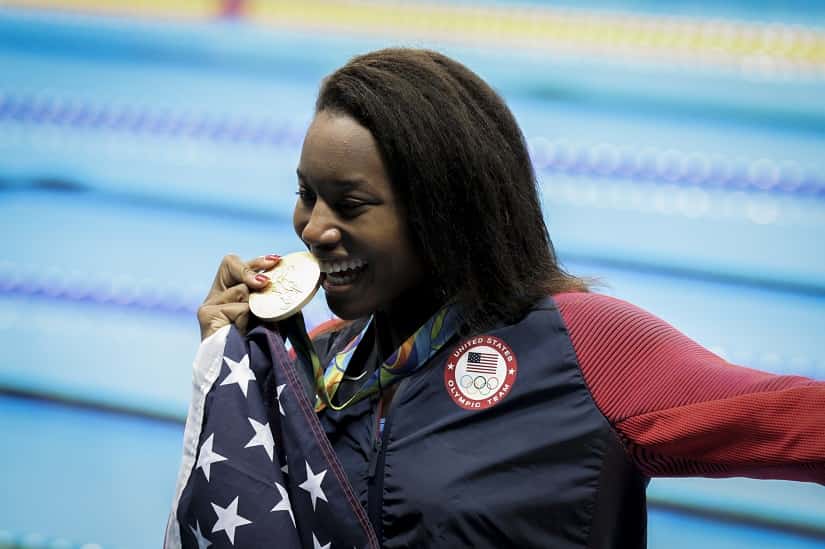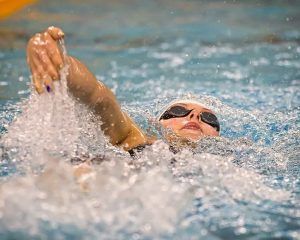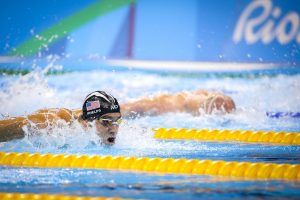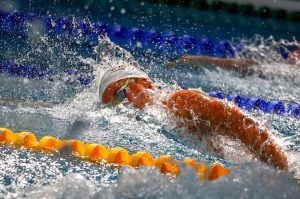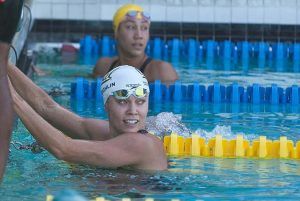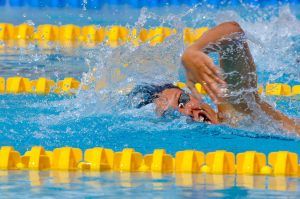Want to eat better, save money and time, and also swim faster? Here is why you should start meal prepping immediately.
My first experience with meal prepping came during high school.
Like most age group swimmers I routinely did doubles during the school week, which meant that each morning I would leave the house for morning practice, swim, go to school, swim again, and then stumble back into the house, water-logged and exhausted, later that evening.
During those early mornings I would stuff my face with a first breakfast, while making a second breakfast, snacks, and a lunch to last me the day.
By the time I shuffled out the door for practice with my swim bag, school bag, and enough food to feed a small family, it would be easy to assume that I was going backpacking for a couple months.
On some evenings, when I was feeling particularly enterprising, I would pack my meals for the following day, exposing me to my first glimpse at the power of meal prepping.
In this little guide to meal prep we are going to talk about why it is so powerful, and I’ll give you some pointers on how to make the process more streamlined (swimming pun!) and efficient.
The Benefits of Meal Prepping
The reality is that meal prepping takes a little bit of up front work and planning, and is exactly why so many swimmers don’t do it. They would rather be rushed and packing meals at the last minute than be proactive.
But the upsides are pretty ridiculous:
1. You will eat better (and swim faster as a result).
You already know that properly fueling yourself is key to your swimming success. Proper nutrition means that you are giving yourself grade-A fuel for high performance swimming, while also priming your body for quick recovery between workouts.
Meal prepping requires meal planning, and when we are consciously choosing what we are going to eat ahead of time we are much less likely to fall whims to the last-second cravings and urges that drive most of our brutal food choices. (“I’m hungry and there is nothing to eat, soooo I better order a pizza!”)
When a healthy meal is the convenient choice better nutrition and eventually better swimming, follow suit.
This aspect alone is worth it. But hey, let’s sweeten the pot with a couple other biggie reasons…
2. It will save you a ton of time.
Each Sunday afternoon while I watch/listen to football I take about two hours to cook my meals for the week. By the end of the two hours, or one quarter of football, I have 3 meals prepared for each day of the upcoming week.
With these meals all I gotta do is toss it in the microwave and nuke it’s butt for 45 seconds or so and I got warm, delicious, and healthy chow to stuff my face with.
Which cuts down on a whole lot of hemming and hawing outside of the refrigerator trying to decide what to eat, and then the time spent actually making it…for twenty-one meals.
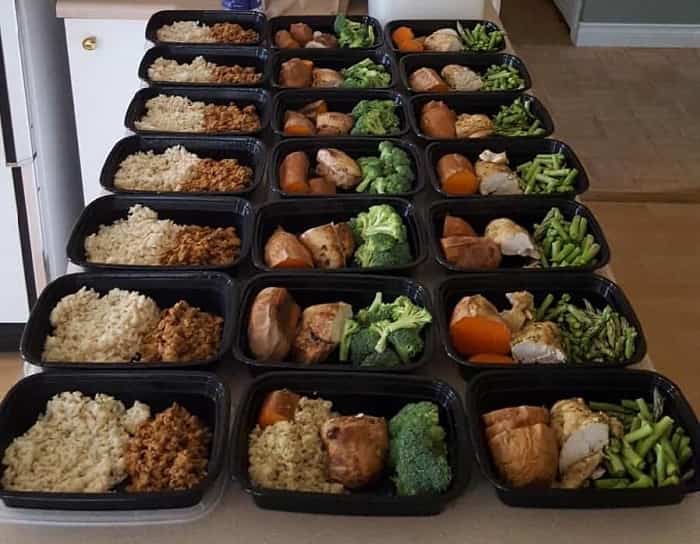
I’m no space scientist or anything, but that is a lot of free time I have opened up to dedicate to napping and, uh, other things I will think of later.
For swimmers who are running a really tight schedule meal prepping can be a total game changer, especially mid-week when you are getting completely decimated with training and schoolwork.
3. It will save you a metric butt-ton of money.
Yes, that first grocery store bill will be hilarious when you start meal prepping. And not the ha-ha hilarious, the sweet molasses what have I done hilarious.
But if you plan it correctly, and once you get a hang of it, you will only really need to go shopping for grub once a week.
More importantly, with ready-made meals at your disposal you are less prone to go buy a made meal somewhere else because you feel like you don’t have the energy to make something.
How to Meal Prep Like a Chlorinated Champ
Okay, so now that we have discussed the awesomeness that comes with prepping your meals, here are some tips for making the most of this super-duper process.
1. Target your worst meal.
I have never struggled with making breakfast, or making good food choices with breakfast.
Perhaps because it’s first thing in the morning and my daily allotment of willpower is topped up, or because fast food in the AM doesn’t sound that appealing (my sugary-carb cravings don’t start gnawing at me till late afternoon), the first meal of the day has always been all good in the hood for me.
Dinners, on the other hand, not so much. Real struggley. By the time that meal comes around I am usually exhausted from a full day of training and work, and by then will literally eat anything as long as it comes with cheese.
Understanding this, when I began meal prepping for my week I started out with my dinners because they were the meal that I was struggling with the most.
You don’t need to cook a week’s worth of food at once, nor every meal—but you should absolutely target the times and meals where you struggle with making respectable culinary decisions.
2. Go in with a plan.
Want to know what the best couple hundred dollars you’ll ever spend is? Getting a legit diet plan from a registered sports dietitian.
Unless you are doing something relatively important at the moment, like open heart surgery, drop whatever it is you are pretending to be doing while reading this article and make an appointment to talk to one.
A couple hundred dollars will get you a meal plan that is based on your likes and dislikes (and allergies and sensitivities too) in the fridge. More importantly, they will put together a meal plan for you that is based on your build and activity level.
That last part is super critical—the dietary needs of each of us is wildly different. The dietitian I have worked with in the past provided a shopping list for my meal plan, taking out all the guesswork.
Conquering your appetite and dietary needs is a full 50m easier when we have supervision and expertise in our corner (and these things are proven to be positive influences on whether or not people stick to their nutrition goals, FYI).
3. Cook everything in bulk.
Now, the way you approach your meal prep is going to come down to your individual circumstances.
Just because I cook everything up on a Sunday doesn’t mean that this is how you want to spend that day of the week. You could just as easily cook a couple days worth of meals at a time, or even spend half an hour each evening cooking up the following day’s meals.
If it works, do it.
But if you want to maximize your time-management returns, cooking everything up at once is a no-brainer.
You will learn how to multi-task like a boss during this process, by the way, becoming master of the kitchen, juggling the stove top, oven, the barbecue, and the chopping board simultaneously.
The Takeaway
I know what you are thinking…
The upsides sound great, and you are feeling motivated about the positive changes you can inflict just by planning your meals out, but there is that one last little piece of resistance, isn’t there?
The thought that you are going to be eating the same meals over and over again is scaring ya off a little bit. The boring nature of meal prepping, and the work involved, sounds like too much of a commitment and redundant.
I need that spice of life, that variety!
Well, I have a little fun fact for you…
If you sat down and wrote out all of your meals over the past couple weeks I would bet you your most rugged drag suit that your meals are shockingly consistent and similar.
You’re already eating the same meals over and over again.
Additionally, there are ways to cook around the “boringness” of meal prepping—different spices, sauces, splitting a baking sheet with tin foil so you can cook three types of seasoned chicken, and so on.
The great secret of success in the pool and in the kitchen isn’t some magic trick or technique, and it’s not even genetics…
It’s embracing the boring nature of doing things a little bit better than the next swimmer each and every day.
More Stuff Like This:
Nutrition for Swimmers: The Ultimate Guide to Eating Better and Swimming Faster. Our ever-growing collection of articles and guides for better fed swimmers.
What Swimmers Should Eat Before, During, and After a Swim Meet. Fuel yourself like a champion so that you can race like a champion. Here are some proven tips from sports dietitians on what to eat before, during, and after a swim meet.

